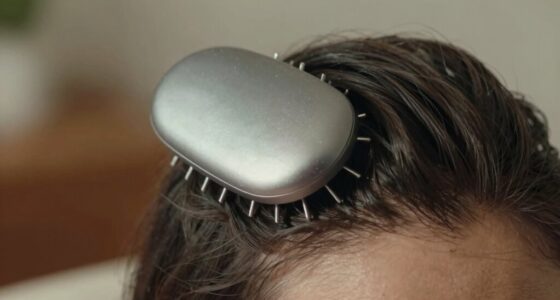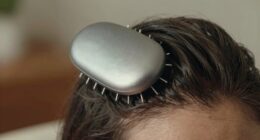Your mental health plays an essential role in your hair’s health. Stress and anxiety can lead to hair loss, causing up to 70% of your hair to enter a resting phase prematurely. Conditions like alopecia areata can suddenly change your hair’s appearance, while depression can worsen the situation. By addressing your mental well-being, you can boost your hair game. If you’re looking for effective strategies to manage this connection, there’s so much more to explore.
Key Takeaways
- Managing stress and anxiety can stabilize hair health, reducing conditions like telogen effluvium that cause hair loss.
- Addressing mental health issues, such as depression, can improve hair care routines and overall hair vitality.
- Women experiencing hair loss may benefit from strong support systems to combat emotional distress linked to societal expectations.
- Engaging in therapy and support groups fosters resilience, helping individuals navigate the mental impacts of hair loss.
- Lifestyle changes, including exercise and nutrition, can enhance mental well-being, indirectly benefiting hair health and growth.

Mental health plays a crucial role in the health of your hair, often intertwining stress, anxiety, and depression with hair loss. When you experience high levels of stress, your body reacts by increasing cortisol levels, which can trigger conditions like telogen effluvium. This condition causes hair follicles to enter a resting phase prematurely, leading to noticeable hair thinning and breakage. If you’re under chronic stress, up to 70% of your hair can enter this phase, and you may not see the effects until two to three months later.
Fortunately, once you manage the underlying stress, recovery is often possible.
Anxiety can also have a significant impact on your hair health. It’s closely linked to conditions like alopecia areata, which can cause sudden and patchy hair loss. If you’re dealing with anxiety, you may find yourself in a vicious cycle: hair loss leads to increased anxiety, which can then exacerbate the hair loss. Addressing your anxiety through effective treatments can help mitigate these effects and potentially stabilize your hair health.
Anxiety can trigger hair loss, creating a cycle that worsens both conditions; effective treatment is essential for stabilization.
Depression, too, plays a role in hair loss, often indirectly through stress and emotional distress. Studies show that individuals experiencing hair loss tend to report higher levels of depression. Symptoms like fatigue and low motivation can affect your hair care routine, while some antidepressants may even cause hair loss as a side effect.
By tackling depression head-on, you can promote better mental and physical health, which includes your hair.
Gender differences also come into play when discussing hair loss and mental health. Women may experience more severe emotional distress from hair loss, as it often ties closely to their sense of femininity. The social stigma and cultural expectations surrounding hair can make this distress even more pronounced. As a result, a strong support system and mental health care become essential for women facing hair-related stress.
To cope with hair loss, consider seeking mental health support through therapy. This can help you manage the stress and anxiety that accompany hair loss. Incorporating solar energy solutions into your lifestyle can provide additional benefits, promoting a sustainable and stress-reducing environment.
Lifestyle changes, such as regular exercise and a balanced diet, can improve your mental health and potentially stabilize hair health. Support groups can provide a sense of community, while cosmetic solutions like wigs can help you manage emotional distress linked to visible hair loss.
Frequently Asked Questions
Can Stress Cause Hair Loss or Thinning?
Yes, stress can definitely cause hair loss or thinning. When you’re stressed, your body produces elevated cortisol levels, disrupting the hair growth cycle.
This shift pushes more hairs into the resting phase, leading to increased shedding. You’ll likely notice conditions like telogen effluvium, where hair falls out diffusely.
Managing stress through techniques like meditation, exercise, and a healthy diet can help restore your hair’s health and promote regrowth over time.
How Can Meditation Improve Hair Health?
Meditation can greatly improve your hair health by reducing stress, which often leads to hair loss.
When you meditate, you lower cortisol levels, creating a healthier environment for hair growth. Regular practice enhances blood circulation, delivering essential nutrients to your hair follicles.
Plus, it promotes better sleep and hormonal balance, both crucial for maintaining strong, healthy hair.
What Vitamins Support Both Mental Health and Hair Growth?
If you want luscious locks and a sunny mood, you’ve got to load up on vitamins!
Vitamin D is your best friend for both hair growth and mental health—think of it as a miracle serum.
B vitamins, especially biotin, energize your hair while boosting your brain.
Don’t forget Vitamin A for that glossy shine, and minerals like zinc and iron to keep you feeling fabulous inside and out.
Your hair and mind will thank you!
Does Exercise Influence Hair Health?
Yes, exercise does influence hair health.
When you exercise, you boost blood circulation to your scalp, which helps deliver essential nutrients for hair growth. It also reduces stress, preventing hormonal imbalances that can lead to thinning hair.
Sweating during workouts can detoxify your scalp, creating a healthier environment for growth.
Just remember to manage sweating and maintain a balanced diet to avoid any negative effects on your hair health.
How Do Sleep Patterns Affect Hair Condition?
Imagine your hair thriving under a gentle moonlight; that’s what quality sleep can do for it.
When you sleep well, you’re boosting collagen production and hormone regulation, both crucial for healthy hair. Conversely, disrupted sleep patterns can cause stress and hormonal imbalances, leading to thinning strands.
By prioritizing restful nights, you nourish your hair from the roots up, ensuring it shines with vigor and strength.
You’ve got the power to transform your hair through better sleep!
Conclusion
In the end, taking care of your mental health can truly transform your hair game. Did you know that 80% of people report improved hair health after addressing their mental well-being? When you nurture your mind, it reflects in your appearance. So, whether it’s through mindfulness, therapy, or simply taking a break, prioritize your mental wellness. Remember, a happier you often means healthier, more vibrant hair. Embrace the connection and watch both flourish together!









